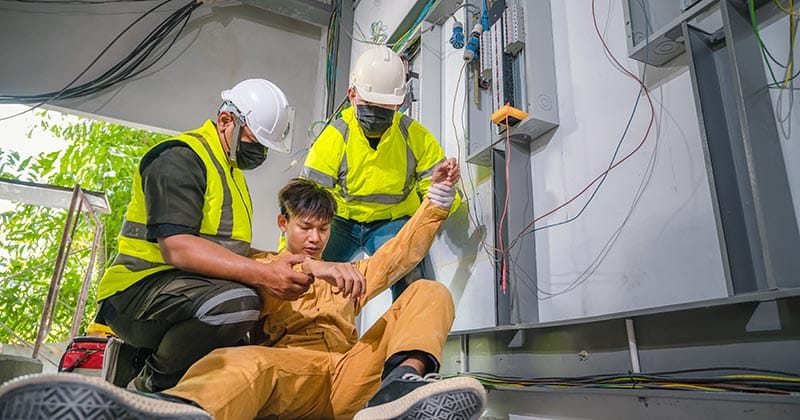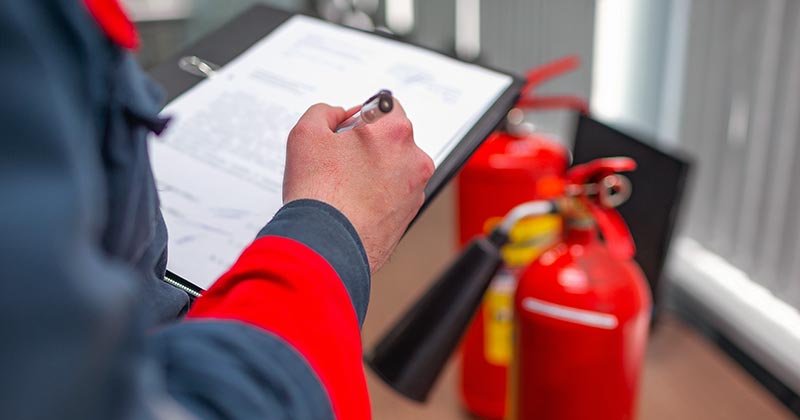Occupational health and safety is one of those careers where it’s easy to imagine the kind of work you might be doing. You’re basically responsible for ensuring workplaces are kept safe. The job sounds interesting but is OHS a good career choice?
An occupational health and safety career has advantages beyond high job satisfaction. OHS specialists also benefit from job security, a competitive salary and advancement opportunities.
Let’s explore the reasons why a career in occupational safety and health may be a good choice for you.
What is Occupational Health and Safety?

Occupational health and safety (OHS) is a field of public health focused on improving job site safety and health standards. Activities are mainly concerned with establishing and communicating safety protocols, examining illness and injury occurrences in the workplace, and providing solutions to eliminate the risks and hazards workers may encounter on their job.
Companies from every industry have their own set of health and safety risks and prevention measures. And it is every employer’s responsibility to ensure their employees’ safety so they can perform their duty with minimum risk of harm. Occupational health and safety courses can therefore create many career possibilities.
Why Choose an Occupational Health and Safety Career?

If you’re looking for a rewarding career with progressive growth, look no further. Enrolling yourself in beginner and advanced level occupational health and safety courses can set you up for career success.
1. Your role will be important in every industry
According to the Bureau of Labor Statistics, an estimated 138,400 people work as OHS specialists and technicians. About 17,200 openings for occupational health and safety professionals are projected each year.
Whether you become an occupational health and safety professional in the automobile or healthcare sector, your role will be significant. You’ll be responsible for creating a healthy and safe workplace for all the employees, including senior executives. Even white-collar jobs entail safety and health issues, such as ergonomics and repetitive strain injuries.
A career path in this area will allow you to make a noticeable difference anywhere you work. As per the survey by Safety and Health Magazine, 74% of the people in Occupational Health and Safety find their job extremely rewarding. Choosing a career in occupational health and safety can make you an important person in any organization.
2. You don’t need an advanced degree for career success
A bachelor degree is becoming the standard requirement for a career in occupational safety and health in the United States. In other countries, such as the UK and Australia, most job vacancies in Occupational Health and Safety do not require a professional university degree.
Having a university degree may help you ascend to a higher position in OHS in a short period but often there is no requirement for it. Graduate degrees are available but are unusual in the industry.
If you want to qualify for health and safety jobs, enrolling yourself in some professional Occupational Health and Safety courses is a great start. At CMI in Ireland, for example, the Diploma in Occupational Health and Safety takes just 11 months. The online course has a practical approach to learning where graduates get the chance to implement their knowledge and skills to gain real work experience. The OHS course explores:
- Health and Safety Standards and Laws
- OHS Jobsite Procedures and Protocols
- Training Methods
- Safety Planning
- Risk Assessment
- Hazard Recognition.
The career advancement opportunities in this area depend on your skill and knowledge. Online courses offer a great chance to improve your skills and increase your technical knowledge related to Occupational Health and Safety standards.
3. Varied career paths are available
Completing an Occupational Health and Safety diploma or degree can provide many opportunities to work in diverse industries. OHS professionals are required to work across different sectors of the economy, including in Government, Manufacturing, Construction, Healthcare, Transportation, and Trade and Distribution.
In addition, you’ll also have chances to enhance further and develop your job training and qualifications. Professional development can lead to securing senior roles in the future. Some standard job titles for an OHS graduate across different industries include:
- Emergency Manager
- Health and Safety Coordinator
- Health and Safety Officer
- Health and Safety Manager
- Health and Safety Specialist
- Risk Assessor
- Site Supervisor.
4. You’ll receive a competitive salary
Depending on your skill, knowledge, and experience, you can earn great money in occupational safety and health.
An Occupational Health and Safety Specialist in the United States can expect to earn salary in the vicinity of $96,887 according to Salary.com.
According to Indeed, Occupational Health and Safety professionals in the UK earn an annual salary of £48,779. The hourly wage in OH&S management is £25.98.
5. Rapid career advancement is achievable
There is excellent potential for career advancement as a graduate of health and safety courses. If you want to stay in one industry of preference, a career in Occupational Health and Safety is an effective way to do it.
You’ll have opportunities to move up to senior positions with greater managerial responsibilities. Potential job titles include safety manager, HSE (Health, Safety and Environment) senior manager, and regional safety specialist.
Disadvantages of Occupational Safety and Health Career

While the advantages of working in safety management are quite convincing, as with any job, there are also some drawbacks. If you can handle each of these cons of the job, an OHS career may be for you.
1. Sometimes people won’t really listen
You may have experienced this on board a flight. Despite the air hostess giving a great safety demonstration, many of the passengers are looking away or otherwise not paying attention.
Occupational health and safety professionals can experience this as well. Although you might know the various risks and dangers and even have seen the consequences, others are less safety aware. You may, at times, be trying to communicate important safety messages to people who aren’t invested in learning.
The key here is to have good two-way communication skills. Read the room and try to pitch your message to connect with your audience. Some stories of past experiences can help enliven things up when giving a danger presentation.
2. You have to bossy when required
Occupational safety and health professionals often have an enforcement role, much like umpires, referees, parking attendants and police officers. So be prepared for occasionally being in some tough situations.
You’ll have inspections and audits to carry out. And you need to ensure people are following protocols. Penalties may apply in circumstances when rules are broken.
You need to be firm when required. Not everyone may like you. The job suits people who are passionate about health and safety and are prepared to do what’s required to achieve their goals.
3. Learning is ongoing
As a health and safety officer, you’ll never be at the point where you can just rely on past knowledge. Each workplace has different risks. Health and safety guidelines vary as well. You’ll most likely need to be across technical information that’s often updated.
If you’re a lifelong learner, this aspect of the job may be fine or actually welcome. But the job is not for people who are lazy when it comes to learning and professional development.
What Health and Safety Specialists Do

When you work as an occupational health and safety specialist, your job is to ensure workplace safety for employees. That is, you must protect workers. Among the many interesting tasks you may be required to do are to:
- Implement safety procedures – Safety specialists introduce, update and communicate safety procedures. They provide protocols to lessen the chance of workplace accidents, injuries or sickness.
- Identify workplace hazards – Inspections are carried out to ensure pathways to emergency exits are clear and anything potentially harmful to workers is removed or properly managed.
- Provide emergency and safety training – Health and safety specialists teach workers about workplace safety, including by providing instruction themselves, bringing in fellow experts or organizing lessons. Examples include evacuation drills and safety equipment demonstrations.
- Investigate accidents – OHS officers investigate workplace accidents and injuries to identify the cause, who may have been at fault, potential negligence, and how to prevent a reoccurrence.
- Examine fixtures and ventilation – Specialists examine work environments to ensure safety and comfort, including with respect to air quality and temperature, safety equipment and sound levels.
- Test samples of potentially toxic materials – Noxious chemicals and substances may be sampled and analyzed as part of OHS inspections. Potential problems include mold and mildew, dirty water, rust and unknown liquids.
As well as these practical tasks, you’ll also do planning. For example, you may also analyze data on OHS measures and incidents, and review the effectiveness of past awareness campaigns. You’ll formulate a strategy for monitoring safety and raising OHS compliance in environments such as factories, schools, offices, public buildings and warehouses.
Health and safety specialists often need to travel as part of the job. You may do this in a proactive, preventative way, such as when you help a new work site establish safety procedures. Other times, you’ll go in response to an accident or near-accident.
Important Qualities in Occupational Health and Safety
Something to like about working in occupational health and safety is that the job is varied. Health and safety specialists have different duties during each day that call for different strengths. Here are some of the key qualities you should have for a career in this field.
- Communication skills – Being an effective communicator is an important part of the job as you’ll regularly talk to managers and employees about safety practices.
- Attention to details – Sloppiness is not a trait you should have. Safety and health standards are often precise in their requirements. You should be able to learn and recall information accurately.
- Well organized – Planning, meeting people, implementing safety plans and monitoring compliance are all duties you’ll need to perform. Doing your job effectively requires you to effectively organize the activities of yourself and others.
- Some physical stamina – You’ll be on your feet more than many workers since you need to travel places and move around work sites.
If you have the necessary qualities, a career in occupational health and safety awaits. With a suitable education, employment opportunities are available for stable, interesting jobs with good pay.
Is it a Good Career?

Lerna Courses reviewed numerous online forums to find out what people in the industry think about their job.
Rewarding and versatile line of work
Overall, the discussions highlight a mix of positive and challenging aspects. Many professionals find the work highly rewarding. It offers the chance to make a tangible difference in workplace safety. The versatility of the field is a major draw. OHS specialists can work in various industries, from healthcare to construction. The potential for rapid career advancement and competitive salaries adds to the appeal.
Challenge of audience receptiveness
However, the forums reveal common challenges. A recurring theme is the difficulty in getting others to take safety regulations seriously. This requires strong communication skills and the ability to handle confrontation. The need for continuous learning and adaptation to new safety standards is also demanding. Despite these challenges, many professionals are satisfied with their roles. They value the stability and impact they achieve.
Find a supportive culture for job satisfaction
Another key point is the variation in job experiences based on industry and employer. Some roles involve extensive travel and hands-on site inspections. Others are more desk-based, focusing on policy and compliance. The work culture and management’s commitment to safety greatly affect job satisfaction. Supportive environments lead to higher job fulfillment, while less supportive settings can cause frustration.


Ethel Chirowa
Couldn’t have been explained any better. I appreciate for making me fall deeper in love with OHS.
What are the requirements for one to study for a nebosh diploma or a degree in occupational health and safety?